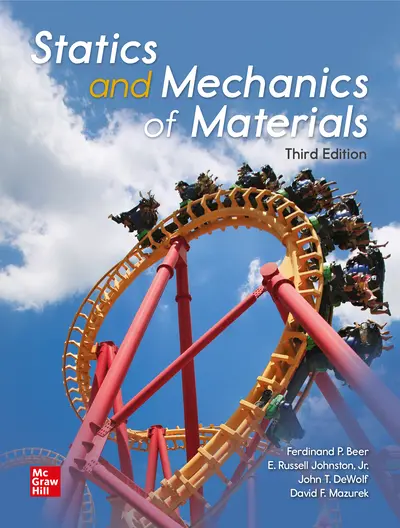My Account Details

ISBN10: 1260226751 | ISBN13: 9781260226751

* The estimated amount of time this product will be on the market is based on a number of factors, including faculty input to instructional design and the prior revision cycle and updates to academic research-which typically results in a revision cycle ranging from every two to four years for this product. Pricing subject to change at any time.
Instructor Information
Quick Actions (Only for Validated Instructor Accounts):
The approach of the Beer and Johnston series has been appreciated by hundreds of thousands of students over decades of engineering education. Maintaining the proven methodology and pedagogy of the Beer and Johnson series, Statics and Mechanics of Materials combines the theory and application behind these two subjects into one cohesive text focusing on teaching students to analyze problems in a simple
and logical manner and, then, to use fundamental and well-understood principles in the solution.
The addition of Case Studies based on real-world engineering problems provides students with an immediate application of the theory. A wealth of problems, Beer and Johnston's hallmark sample problems, and valuable review and summary sections at the end of each chapter, highlight the key pedagogy of the text.
1. Introduction
2. Statics of Particles
3. Rigid Bodies: Equivalent Systems of Forces
4. Equilibrium of Rigid Bodies
5. Distributed Forces: Centroids and Centers of Gravity
6. Analysis of Structures
7. Distributed Forces: Moments of Inertia
8. Concept of Stress
9. Stress and Strain-Axial Loading
10. Torsion
11. Pure Bending
12. Analysis and Design of Beams for Bending
13. Shearing Stresses in Beams and Thin-Walled Members
14. Transformations of Stress
15. Deflection of Beams
16. Columns
Appendix A: Reactions at Supports and Connections
Appendix B: Centroids and Moments of Inertia of Common
Geometric Shapes
Appendix C: Typical Properties of Selected Materials Used in
Engineering
Appendix D: Properties of Rolled-Steel Shapes
Appendix E: Beam Deflections and Slopes
Index
Answers to Problems
Accessibility
Creating accessible products is a priority for McGraw Hill. We make accessibility and adhering to WCAG AA guidelines a part of our day-to-day development efforts and product roadmaps.
For more information, visit our accessibility page, or contact us at accessibility@mheducation.com
Need support? We're here to help - Get real-world support and resources every step of the way.